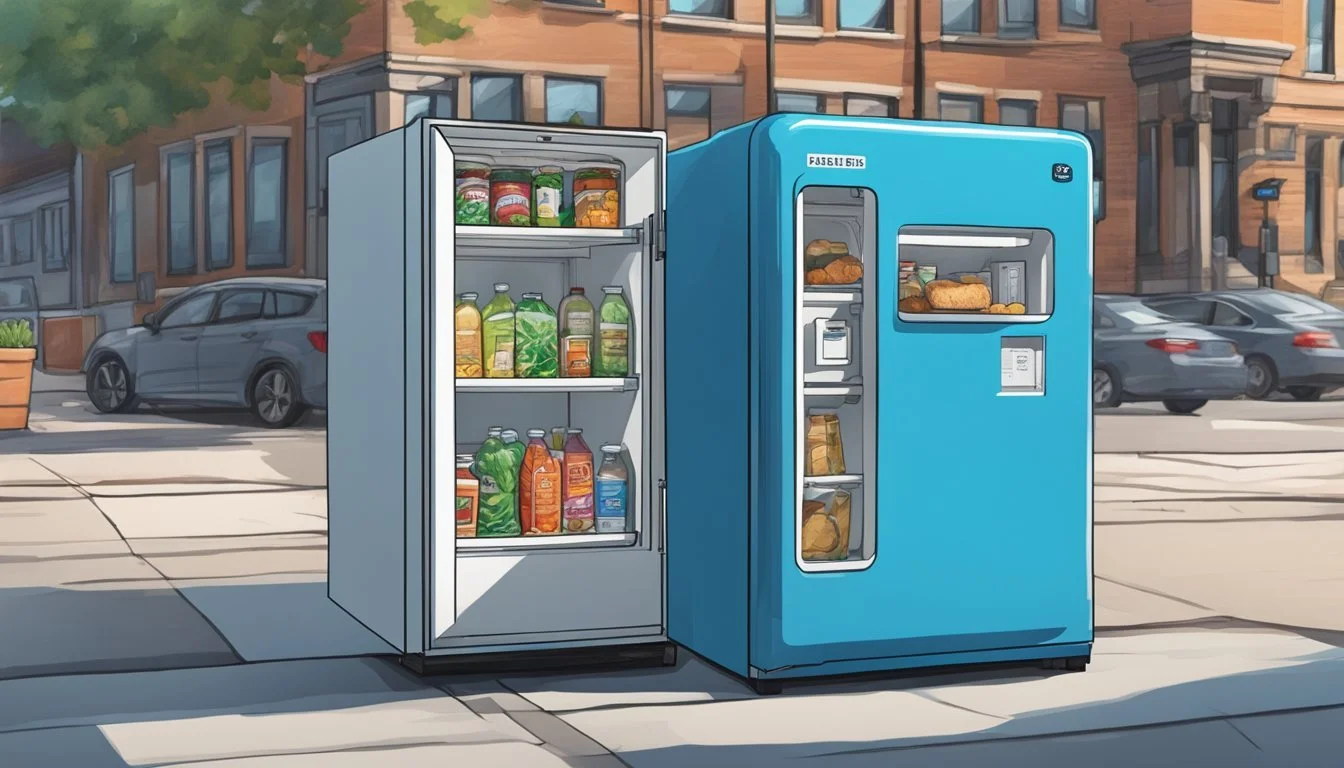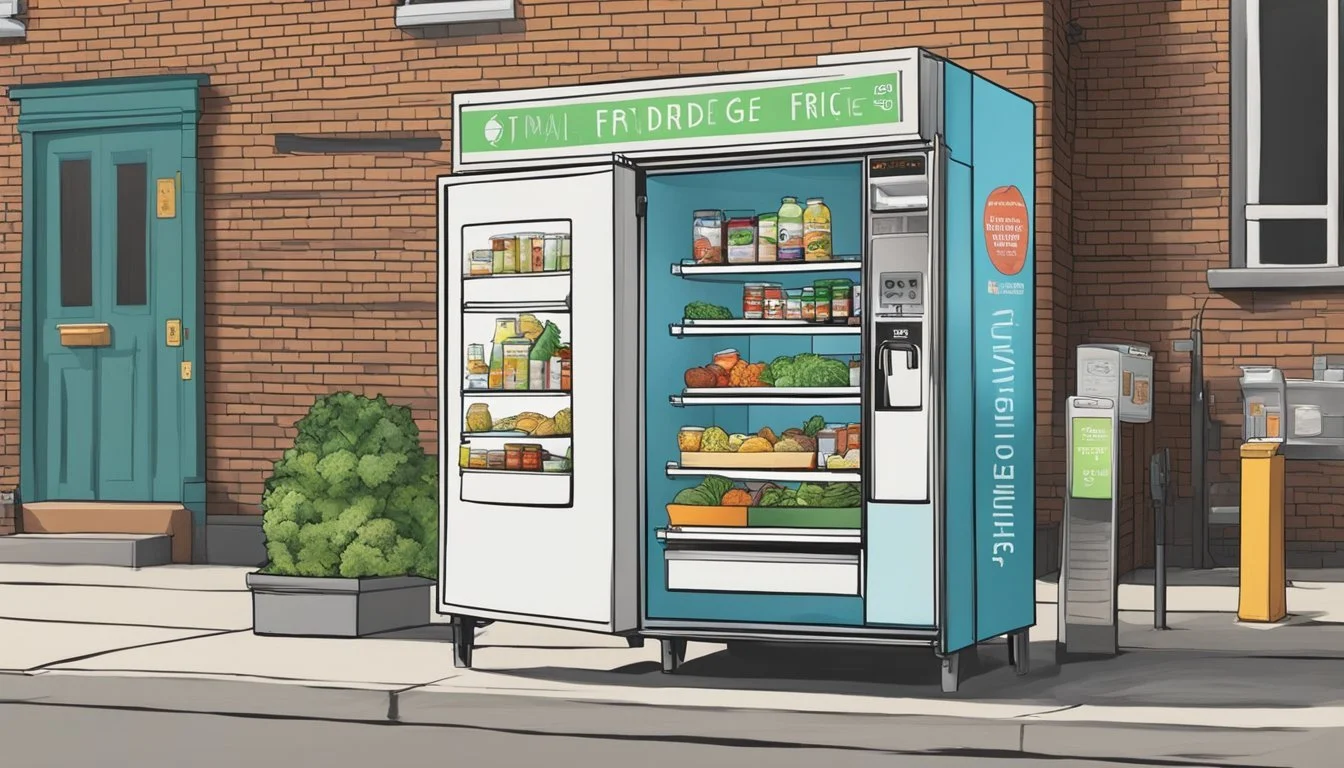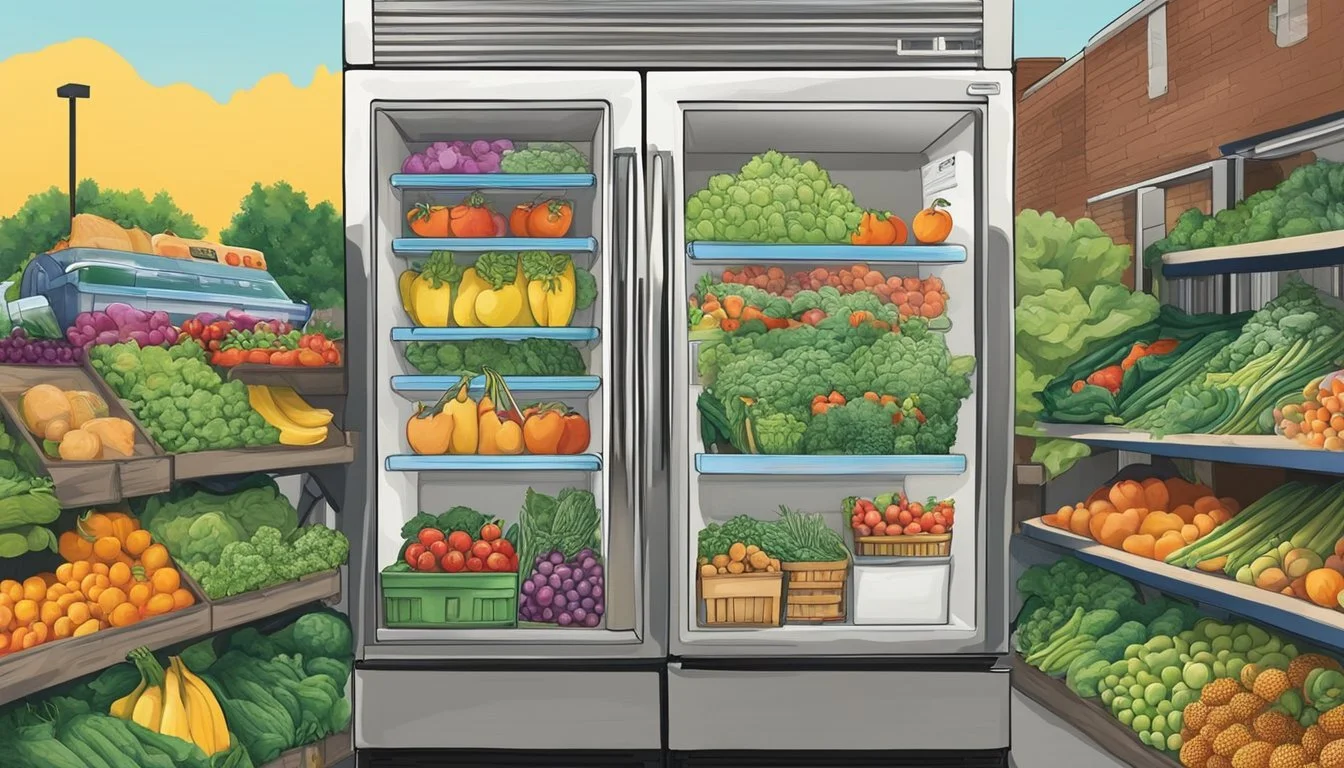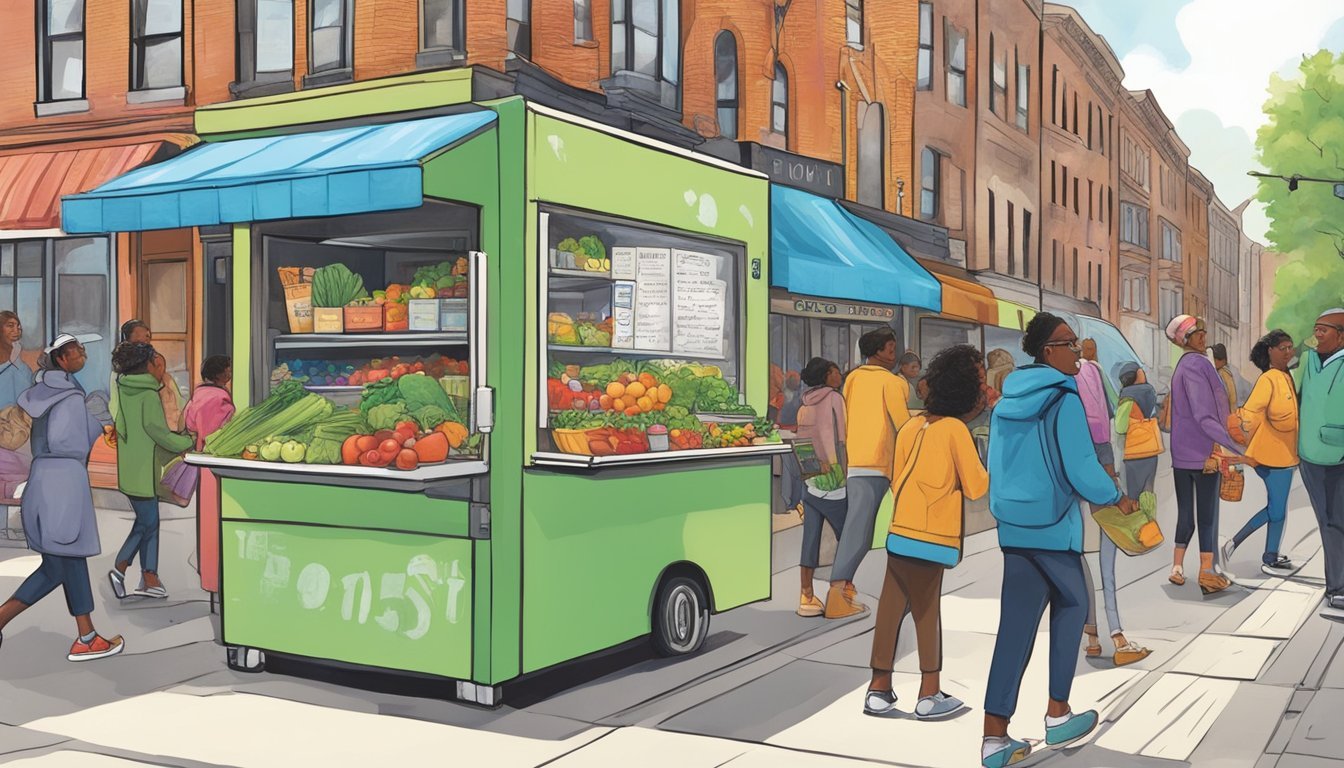Detroit, MI Community Fridge Initiative
Providing Fresh Food for All
Community fridges in Detroit, Michigan, are emerging as a functional solution to food insecurity and waste. They operate on a simple premise: take what you need and give what you can. These refrigerators are usually connected to organizations or local groups and are strategically placed in accessible locations to serve the community around the clock. The concept started gaining momentum in Detroit with the installation of the first community fridge by Wayne State University students in August 2020, and since then, multiple fridges have popped up across the city.
The fridges offer free food to anyone passing by, eliminating the usual barriers that come with traditional food aid programs. In a city where many residents face economic challenges, these refrigerators represent a beacon of mutual aid and solidarity. Contributors to the fridges include local residents, community groups, and businesses, all united by the goal of reducing hunger and food waste.
Detroit Community Fridge, among others, marks a significant community-led effort to make food accessible to all, 24/7. With various locations across Detroit, these fridges are not only about providing food but also fostering a sense of community and support among residents. The success of these fridges in Detroit showcases the potential of grass-roots movements to address and mitigate the complexities of urban food scarcity.
Overview of Community Fridges
Community fridges have emerged as a means to combat food insecurity, offering free, accessible food to anyone in need. This initiative fosters community sharing, where the benefits are twofold: supporting individuals in need and reducing food waste.
What Is a Community Fridge?
A community fridge is a refrigerator placed in a public space, where individuals and businesses can share surplus food and anyone in need can take food for free. The fridge operates on a simple principle: "take what you need, bring what you can." The initiative aims to provide fresh produce and dry goods, making them available 24/7 to ensure that all community members have access to food outside of traditional business hours.
History and Growth of Community Fridges
The concept of community fridges began garnering attention in Detroit with the launch of the first Detroit Community Fridge in August 2020. Two graduate students, Emily Eicher and Alyssa Rogers from Wayne State University, initiated the project to address the growing food insecurity in the city. The initiative has since seen multiple fridges established across Detroit, functioning as a grassroots response to the needs of locals and reflecting a model of sustainable community support.
Community Fridge Movement in Detroit
The concept of community fridges has established a firm presence in Detroit. These fridges offer free, accessible food to help alleviate hunger and reduce food waste.
Detroit Community Fridge Initiatives
Detroit has witnessed the emergence of multiple community fridges throughout the city. These are often placed near locations that provide additional assistance, including family services and free hygiene products. For example, Bridging Communities and Santos Church are two of the sites hosting these fridges, with the latter located at 1953 Military St. Another location is Beaverland Farms at 15052 Grayfield St. These fridges play a crucial role in Detroit's mutual aid efforts by providing 24/7 access to food for those in need.
Locations of Notable Community Fridges in Detroit:
Bridging Communities: 6900 McGraw Ave, Detroit, MI 48210
Santos Church: 1953 Military St, Detroit, MI 48209
Beaverland Farms: 15052 Grayfield St, Detroit, MI 48223
Islandview: 1812 Field St, Detroit, MI 48214
Key Players and Organizations
The Detroit Community Fridge project is supported by various local players and organizations dedicated to fighting food insecurity. These fridges are stocked with fresh produce, dry goods, and other essentials and are typically available to the public around the clock. The project, established with the goal of supplying fresh produce and necessities to locals, shows the power of grassroots organization and the impact of community-driven solutions.
Key organizations involved in the Detroit Community Fridge movement include:
Bridging Communities - A non-profit organization that has been instrumental in setting up some of the community fridges.
Partnerships with local churches and community associations, which play a pivotal role in maintaining and stocking the fridges to ensure they are replenished with food.
Impact on Food Insecurity
Community fridges in Detroit are tackling a serious issue that affects many residents: food insecurity. They play a crucial role in offering regular and reliable access to nutritious food for those in need.
Addressing Food Deserts in Detroit
In several areas of Detroit, the availability of fresh, affordable food is scarce due to the presence of food deserts. Community fridges are strategically placed to serve these neighborhoods where supermarkets are either non-existent or inaccessible to residents without reliable transportation. By filling this void, community fridges empower community members to obtain produce and other food items that are essential for a healthy diet.
Benefits of Community Fridges
Accessibility and Convenience: Community fridges are open to anyone without restriction, which means individuals and families can easily access free food.
Reduction in Stigma: In contrast to traditional food aid programs, community fridges offer a no-questions-asked approach, which reduces the potential for stigma and encourages more people to take advantage of the resources available.
Reduces Food Waste: By providing a space for the community to share surplus food, these fridges prevent edible food from ending up in landfills.
Community Empowerment: These fridges foster a sense of community ownership and mutual aid, as they are often stocked and maintained by local volunteers and donations.
Through the implementation of community fridges, Detroit is taking a tangible step towards addressing food insecurity, offering a practical solution that makes a daily difference in the lives of its residents.
Location and Accessibility
Community fridges in Detroit provide essential support for food insecurity and are notable for their ease of access. They are strategically situated to serve the community effectively.
Where to Find Community Fridges in Detroit
Southwest Detroit:
Santos Church: Located at 1953 Military St, Detroit, MI 48209.
Beaverland Farms: Situated at 15052 Grayfield St, Detroit, MI 48223.
Islandview Area:
Islandview Community Fridge: Found at 1812 Field St, Detroit, MI 48214.
All these fridges are available 24/7 to the community, ensuring constant access to food resources.
Transportation and Access
Southwest Detroit:
Accessible via multiple bus routes catering to the local community.
Close to residential areas, allowing for walkable access to the sites.
Proximity to Wayne State University:
Community members and students have convenient access to fridges, promoting mutual support within the university's community.
Church and Community Collaboration:
The presence of fridges at places like Santos Church demonstrates an active engagement between religious institutions and community support mechanisms.
The fridges' locations are selected with transportation options in mind, ensuring they are readily accessible for all community members, including those without private vehicles.
Supporting the Fridge Network
The Detroit Community Fridge network thrives on the generosity of individual contributions and collective community efforts. Ensuring continuous operation involves both food and monetary donations, as well as a commitment from volunteers to maintain and grow the initiative.
How to Donate Food and Money
Food Donations: Individuals can contribute to the community fridges by donating perishable and nonperishable food items. These donations can be placed directly into any of the community fridges located around Detroit. It's important that the donated items are fresh and safe for consumption.
Acceptable food items include:
Fresh fruits and vegetables
Packaged foods with unbroken seals
Foods within their expiration date
Monetary Donations: Monetary contributions are crucial for covering the operational costs associated with the fridges, such as electricity and maintenance. Donors interested in supporting financially can often find donation links on the initiative's official website or social media pages.
Volunteering and Community Involvement
Volunteers are the backbone of the community fridge network. They ensure the fridges are clean, well-organized, and stocked with food. Interested individuals can get involved by reaching out to the organization through their contact information provided online. Volunteer roles range from fridge maintenance to food sorting.
Ways to volunteer:
Cleaning and maintaining the fridges
Organizing food donations
Helping with community outreach initiatives
Through these concerted efforts, the Detroit Community Fridge network aims to address food insecurity and strengthen neighborhood solidarity.
Operational Challenges
The success of the Detroit Community Fridge initiative hinges on efficiently tackling a host of operational challenges, primarily concerning maintenance and food safety.
Maintenance and Restocking
Daily Monitoring: Community fridges require regular monitoring to ensure they remain operational and clean. Volunteers or organizers must inspect these fridges daily, checking for maintenance needs or potential wear and tear that could impede their function.
Consistent Supply: Ensuring a steady flow of donations is critical to avoid empty shelves. The fridges rely on community contributions which must be regularly restocked to maintain the supply of free food.
Tackling Food Waste and Safety
Rotating Stock: Strict procedures are established for rotating food items to mitigate waste. Perishable goods are particularly vulnerable to spoilage, thus tracking expiration dates and removing outdated items is crucial to ensure food safety and minimize waste.
Safety Protocols: Strict safety protocols are implemented to ensure the food provided is safe for consumption. This includes:
Regular Cleaning: Scheduled cleaning routines to keep the space hygienic.
Safe Handling: Guidance for volunteers on proper food handling to prevent contamination.
Waste Disposal: The project must manage the disposal of spoiled goods and packaging materials, ensuring they do not contribute to trash problems in the community.
Community Engagement and Outreach
Detroit Community Fridge leverages a robust community engagement strategy to address food insecurity through educational initiatives and a strong online presence. This dual approach ensures they reach a wide audience, providing direct assistance and fostering long-term community empowerment.
Educational Programs and Counseling
Detroit Community Fridge doesn't only provide food; it also offers educational programs designed to teach community members about nutrition, food safety, and sustainable practices. By partnering with local organizations, they facilitate workshops where individuals can learn about healthy eating habits and how to reduce food waste. Counseling services are a cornerstone of these programs, aiming to address the underlying causes of food insecurity and empower residents with knowledge and skills for better food management.
Key Offerings:
Nutritional Workshops
Food Safety Training
Sustainability Education
Personalized Counseling Sessions
Social Media and Online Presence
The fridge's online presence serves as a critical tool for outreach and engagement. Social media platforms, especially Instagram, play a vital role in updating the community about new fridge locations, available resources, and how to contribute. Users are encouraged to share their experiences and spread the word, amplifying the project's reach and impact.
Instagram Highlights:
Updates on fridge contents and needs
Stories featuring community contributions
Posts about upcoming educational events
A transparent financial system is maintained through Venmo, allowing community members to see how donations are being used and to contribute easily to the cause. This openness fostered by clear communication assures donors of their positive impact on Detroit communities.
Venmo Insights:
Display of recent transactions
Regular financial updates
Simple donation process
Partnerships and Collaborations
The Detroit Community Fridge initiative thrives on strong partnerships and collaborations, involving local businesses, nonprofits, and engagement with government policies. These relationships contribute significantly to the project's success, ensuring consistent support and resources.
Local Businesses and Nonprofits
Hats Galore & More is an example of a local business partner providing not just the physical space for one of the community fridges but also electricity and maintenance support. This partnership ensures that the fridge is operational and accessible at all times. Nonprofit organizations, such as Bridging Communities, are instrumental in the project, contributing locations like the one at 6900 McGraw Ave. Moreover, the Islandview fridge represents a unique collaboration among Planted Detroit, Sister Pie, and Black Bottom Businesses LLC, displaying the synergy between community-oriented groups.
Government and Policy Engagement
While specifics on policy engagement weren't directly noted in the provided excerpts, government involvement in community fridge projects often includes ensuring regulatory compliance and potentially offering support for initiatives that combat food insecurity. Entities like the Detroit Community Fridge may interact with local government to navigate the necessary regulations for public food service and to align with citywide initiatives aimed at reducing hunger and promoting sustainability.
Staple Foods and Nutrition
Detroit Community Fridge initiatives prioritize making different types of wholesome foods available to the community. They focus on providing not just food but nutritious options that contribute to a balanced diet.
Types of Foods Available
The available foods in Detroit's community fridges typically include a variety of fresh produce such as vegetables and fruits which are essential for a healthy diet. These fridges also stock dry goods that serve as pantry essentials, forming the basis of many nutritious meals. The selection usually covers:
Fresh vegetables (e.g., leafy greens, tomatoes)
Fruits (e.g., apples, oranges)
Dry goods (e.g., rice, beans)
Ensuring Nutritious Options
The organizers behind these community fridges ensure that the foods provided are healthy and nutritious. They strive to offer a selection that supports a balanced diet, focusing especially on:
Fresh food that has high nutritional value
Offering a diverse range of produce to meet different dietary needs
Their goal is to help alleviate food insecurity by providing food that is not only free but also contributes positively to the community’s health.
Future Directions
The community fridge initiative in Detroit has shown a positive impact, meeting the immediate needs of residents by addressing food insecurity. This section will look into how the initiative can grow and sustain its success in the future.
Scaling and Expanding the Network
The expansion of the network is imperative to reach more neighborhoods such as Islandview. Strategies for expansion include:
Partnering with local grocery stores and businesses to secure a steady supply of food donations.
Encouraging more community organizing to manage and maintain new fridge locations.
Fostering relationships with local farmers and food producers to diversify the sources of food.
Key action items:
Identify potential sites in underserved areas.
Establish new community partnerships.
Develop a scalable management model.
Long-Term Goals and Visions
Sustainability of the Detroit Community Fridge project hinges on their long-term strategies. Their vision extends beyond simply offering free food – it encompasses community empowerment and systemic change in how society addresses food scarcity.
Future objectives include:
Promoting educational programs on nutrition and food sustainability.
Advocating for policy changes that support long-term solutions to food insecurity.
Measures for long-term sustenance:
Organizing fundraising to ensure fridges are well-stocked and operational.
Engaging residents in volunteer programs to create a sense of ownership and responsibility.
Notable Figures and Testimonials
In the heart of Detroit, the Community Fridge serves as a vital resource for residents, supported by key individuals and embraced through compelling personal narratives.
Community Leader Spotlights
Emily Eicher and Alyssa Rogers stand at the forefront of the Detroit Community Fridge initiative. They ignited the movement with a passion to combat food insecurity, leading by example with the establishment of community fridges throughout Detroit. Eicher's extra fridge marked the beginning of a local movement that has expanded to serve numerous residents with the vital sustenance they require.
Personal Stories and Impacts
Residents have shared transformational stories, detailing how the community fridges have positively affected their lives. For some, these fridges represent more than just food; they serve as a beacon of hope and community solidarity. The fridges have not only alleviated hunger but also fostered a sense of togetherness in times of need.
Additionally, beyond providing food, the fridge initiative has been coupled with unique approaches to community support, such as art therapy. This holistic approach reinforces the profound impact of the community fridge movement on the well-being of Detroit residents.
How to Get Involved
The Detroit Community Fridge provides a platform for individuals and organizations to contribute to food security efforts. Participation can take many forms, from stocking the fridge to initiating a new one.
Contributing to the Detroit Community Fridge
Individuals and organizations can support the Detroit Community Fridge in several specific ways. Donations of fresh produce can come from local sources such as Planted Detroit or Beaverland Farms. These contributions are crucial for maintaining a steady supply of nutritious options. Another method is to donate food items from a grocery store, which should be unopened and within their expiration dates to ensure safety and quality. Those interested can drop off donations directly at existing fridge locations, accessible 24/7.
Monetary donations are also invaluable for the maintenance and expansion of community fridges throughout Detroit. Money raised can help with the operational costs, such as electricity for the fridges or purchasing additional food items.
Volunteering time is another key aspect of involvement. Volunteers may help with cleaning and organizing the fridges or assist with community outreach to raise awareness about the initiative.
Starting a Community Fridge in Your Area
Those inspired by the Detroit model can start a community fridge in their area, even beyond Michigan's borders, like in cities such as Chicago or countries such as the UK. The first step involves identifying a suitable and accessible location. This could be in partnership with a shelter, community center, or willing business establishment that can offer space and electricity.
Once a location is secured, reach out to local farms and grocery stores to establish a consistent supply chain of donations. Engaging with the community through social media and local events can help in gathering volunteers and managing the project effectively.
Clear communication with community members about food safety, the purpose of the fridge, and how they can contribute will lay the groundwork for a successful community fridge. Coordination with local health departments ensures compliance with food safety regulations and builds credibility with potential donors and participants.
In every step, transparency and open calls for support keep the community involved and invested in the success of the fridge.










